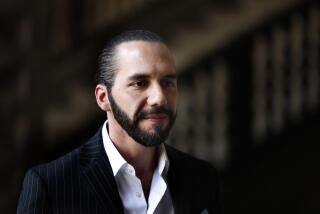Venezuelan President Says He May Seek Special Powers
CARACAS, Venezuela — Less than one week after a new Congress opened, President Hugo Chavez said Thursday that he may seek special powers that would allow him to sidestep the legislature on key issues.
Chavez asserted at a news conference that Congress may be too bogged down with regulatory issues to attend to pressing problems such as unemployment, land reform and the tax system.
He said he might ask the legislature to grant him a fast-track enabling law that would allow him to unilaterally push through his agenda.
Opposition parties have said they would not approve such a law, but leaders of Chavez’s majority coalition have said they would consider it. Chavez’s allies have the three-fifths majority needed to pass the law under the country’s new constitution.
Chavez said the legislature can’t deal with Venezuela’s problems quickly enough. “That’s why the law exists--to face situations like this,” he said.
Critics say the enabling law would undermine the new Congress’ authority. They say Chavez has run roughshod over the government’s separation of powers since he became president in February 1999, promising a “social revolution” for the poor.
Chavez, a former paratrooper who staged a failed military coup in 1992, governed without a democratically elected Congress for nearly a year while the country awaited elections to confirm public institutions as called for by a new constitution.
Chavez won a new six-year term during those elections, which were held July 30.
“To grant the president the enabling law would be to prolong a state of transition and give an impression of a state of emergency that we thought we had gotten past,” opposition legislator Julio Borges said.
Chavez also criticized neighboring Guyana for what he said was its increasingly aggressive attitude in a dispute over a mineral-rich, 76,000-square-mile territory that both countries claim.
“What is behind this? Why such an aggressive attitude from Guyana?” Chavez said.
Guyana Foreign Minister Clement Rohee was quoted as saying by Venezuela’s El Nacional newspaper Thursday that his country wouldn’t cede an inch of the disputed Essequibo territory.
More to Read
Sign up for Essential California
The most important California stories and recommendations in your inbox every morning.
You may occasionally receive promotional content from the Los Angeles Times.










